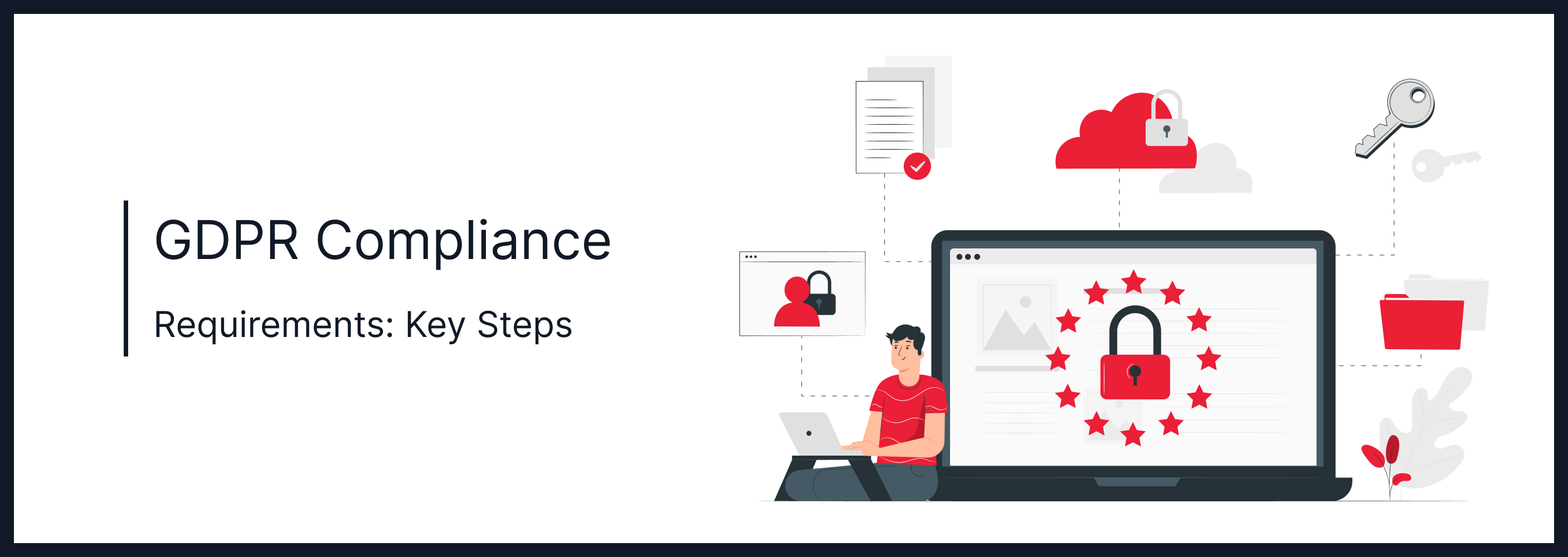
Oct 15, 2024 Information hub
GDPR Compliance Requirements: Key Steps for Businesses in 2025
In today’s digital age, data is one of the most valuable assets for businesses. However, with the increasing reliance on data comes the responsibility to protect it. The General Data Protection Regulation (GDPR) is a landmark regulation that was introduced by the European Union (EU) to safeguard personal data and ensure privacy for individuals. Since its enforcement on May 25, 2018, GDPR has had a profound impact on how businesses collect, store, and process personal data. For businesses operating in or dealing with customers in the EU, understanding and adhering to GDPR compliance requirements is not just a legal obligation but also a critical factor in maintaining trust and credibility. Non-compliance can lead to hefty fines, reputational damage, and loss of customer trust. In this blog post, we will explore the key GDPR compliance requirements, their relevance in today’s business landscape, and practical steps businesses can take to ensure compliance.
Why GDPR Compliance Requirements is Relevant Today
The GDPR was introduced in response to growing concerns about data privacy and the misuse of personal information. With the rise of digital platforms, social media, and e-commerce, individuals are sharing more personal data than ever before. This has led to increased scrutiny over how businesses handle this data.
Key Reasons for GDPR’s Continued Relevance:
- Data Breaches: High-profile data breaches, such as those involving Facebook, Equifax, and Marriott, have highlighted the importance of robust data protection measures.
- Consumer Awareness: Consumers are becoming more aware of their data rights and are demanding greater transparency from businesses.
- Global Impact: While GDPR is an EU regulation, its impact is global. Any business that processes the personal data of EU citizens, regardless of where the business is located, must comply with GDPR.
- Evolving Data Practices: As businesses adopt new technologies like artificial intelligence (AI) and machine learning, the volume and complexity of data processing increase, making GDPR compliance even more critical.
Key GDPR Compliance Requirements
To comply with GDPR, businesses must adhere to several key principles and requirements. These requirements are designed to ensure that personal data is handled lawfully, transparently, and securely.
1. Lawful Basis for Processing Personal Data
Under GDPR, businesses must have a lawful basis for processing personal data. There are six lawful bases for processing, including:
- Consent: The individual has given clear consent for their data to be processed for a specific purpose.
- Contract: Processing is necessary for the performance of a contract with the individual.
- Legal Obligation: Processing is necessary to comply with a legal obligation.
- Vital Interests: Processing is necessary to protect someone’s life.
- Public Task: Processing is necessary to perform a task in the public interest.
- Legitimate Interests: Processing is necessary for the legitimate interests of the business, provided these interests are not overridden by the individual’s rights.
Practical Example:
A retail company collecting customer email addresses for marketing purposes must obtain explicit consent from the customer. The consent must be freely given, specific, informed, and unambiguous.
2. Data Minimization
GDPR requires businesses to collect only the data that is necessary for the specific purpose for which it is being processed. This principle of data minimization ensures that businesses do not collect excessive or irrelevant data.
Practical Example:
An online store should only collect the information necessary to process an order, such as the customer’s name, address, and payment details. Collecting additional information, such as the customer’s social security number, would be considered excessive and a violation of GDPR.
3. Transparency and Communication
Businesses must be transparent about how they collect, use, and store personal data. This includes providing clear and concise privacy notices that explain:
- What data is being collected.
- Why the data is being collected.
- How the data will be used.
- Who the data will be shared with.
- How long the data will be retained.
Practical Example:
A mobile app that collects location data must inform users why the data is being collected (e.g., to provide location-based services) and how it will be used. The app must also provide users with the option to opt-out of location tracking.
4. Data Subject Rights
GDPR grants individuals several rights regarding their personal data, including:
- Right to Access: Individuals have the right to request access to their personal data.
- Right to Rectification: Individuals can request that inaccurate or incomplete data be corrected.
- Right to Erasure (Right to be Forgotten): Individuals can request that their data be deleted under certain circumstances.
- Right to Restrict Processing: Individuals can request that the processing of their data be restricted.
- Right to Data Portability: Individuals can request that their data be transferred to another organization.
- Right to Object: Individuals can object to the processing of their data for certain purposes, such as direct marketing.
Practical Example:
A customer of an online subscription service can request access to all the personal data the company holds about them. The company must provide this information within one month of the request.
5. Data Security and Breach Notification
Businesses must implement appropriate technical and organizational measures to ensure the security of personal data. This includes protecting data from unauthorized access, loss, or destruction. In the event of a data breach, businesses must notify the relevant supervisory authority within 72 hours and inform affected individuals if the breach poses a high risk to their rights and freedoms.
Practical Example:
A financial services company that experiences a data breach affecting customer credit card information must notify the relevant data protection authority and inform affected customers within 72 hours.
6. Data Protection by Design and Default
GDPR requires businesses to implement data protection measures from the outset of any project or process that involves personal data. This is known as “data protection by design.” Additionally, businesses must ensure that, by default, only the minimum amount of personal data necessary for a specific purpose is processed.
Practical Example:
A software company developing a new app must incorporate data protection features, such as encryption and anonymization, into the app’s design from the beginning.
7. Appointment of a Data Protection Officer (DPO)
Certain businesses are required to appoint a Data Protection Officer (DPO) to oversee GDPR compliance. This requirement applies to:
- Public authorities.
- Organizations that engage in large-scale systematic monitoring of individuals (e.g., online behavior tracking).
- Organizations that process large amounts of sensitive personal data (e.g., health data).
The DPO is responsible for ensuring that the organization complies with GDPR and acts as a point of contact for data protection authorities.
Practical Example:
A hospital that processes large amounts of patient health data must appoint a DPO to ensure compliance with GDPR and to handle any data protection-related inquiries.
Challenges in Achieving GDPR Compliance requirements
While GDPR provides a clear framework for data protection, achieving compliance can be challenging for businesses, especially those that handle large volumes of data or operate across multiple jurisdictions.
1. Complexity of Data Management
Many businesses struggle with managing the sheer volume of data they collect. Ensuring that data is accurate, up-to-date, and processed in accordance with GDPR can be a daunting task, particularly for organizations with legacy systems or decentralized data storage.
2. Cross-Border Data Transfers
GDPR places strict restrictions on the transfer of personal data outside the EU. Businesses that operate globally must ensure that any data transfers to non-EU countries are compliant with GDPR, which can involve complex legal agreements and additional safeguards.
3. Balancing Data Protection with Innovation
As businesses adopt new technologies, such as AI and machine learning, they must find ways to balance innovation with data protection. These technologies often rely on large datasets, which can create challenges in ensuring compliance with GDPR’s data minimization and transparency requirements.
Benefits of GDPR Compliance
While GDPR compliance can be challenging, it also offers several benefits for businesses:
- Enhanced Customer Trust: By demonstrating a commitment to data protection, businesses can build trust with their customers, leading to increased loyalty and retention.
- Competitive Advantage: Businesses that prioritize data protection can differentiate themselves from competitors and attract privacy-conscious customers.
- Reduced Risk of Fines: GDPR non-compliance can result in fines of up to €20 million or 4% of a company’s global annual revenue, whichever is higher. By complying with GDPR, businesses can avoid these costly penalties.
- Improved Data Management: GDPR encourages businesses to adopt better data management practices, which can lead to more efficient operations and better decision-making.
Current Trends and Future Developments
As data protection continues to evolve, several trends and developments are shaping the future of GDPR compliance:
1. Increased Enforcement
Since GDPR came into effect, data protection authorities have been ramping up enforcement efforts. High-profile fines, such as the €50 million fine imposed on Google by the French data protection authority, serve as a reminder that non-compliance can have serious consequences.
2. Emerging Technologies
As businesses adopt emerging technologies like AI, blockchain, and the Internet of Things (IoT), they must ensure that these technologies are compliant with GDPR. This may involve developing new data protection frameworks and guidelines to address the unique challenges posed by these technologies.
3. Global Data Protection Laws
GDPR has inspired similar data protection laws in other countries, such as the California Consumer Privacy Act (CCPA) in the United States and Brazil’s General Data Protection Law (LGPD). As more countries adopt data protection regulations, businesses will need to navigate an increasingly complex global regulatory landscape.
Conclusion
GDPR compliance is not just a legal requirement; it is a critical component of building trust with customers and protecting the integrity of personal data. By understanding and adhering to the key GDPR compliance requirements, businesses can avoid costly fines, enhance their reputation, and improve their data management practices.
To ensure compliance, businesses should:
- Review their data collection and processing practices.
- Implement robust data security measures.
- Appoint a Data Protection Officer if required.
- Regularly review and update their privacy policies.
- Stay informed about emerging trends and developments in data protection.
By taking these steps, businesses can not only comply with GDPR but also position themselves for success in an increasingly data-driven world.
Actionable Takeaways:
- Conduct a GDPR compliance audit to identify any gaps in your data protection practices.
- Ensure that you have a lawful basis for processing personal data and obtain explicit consent where necessary.
- Implement data minimization practices to avoid collecting excessive data.
- Regularly review and update your privacy notices to ensure transparency.
- Appoint a Data Protection Officer if your business meets the criteria.
- Stay informed about changes in data protection laws and emerging technologies that may impact your compliance efforts.
By following these recommendations, businesses can navigate the complexities of GDPR and build a strong foundation for data protection and privacy.
